|
|
|

Code 128 is one of the most widely used barcode symbologies. Code128 barcode requires checksum calculation.
With Barcodesoft Code128 barcode font package and Microsoft® Access®, it has never been so easy to print code128 bar code from your Windows computer and desktop printer.
1. Copy all true type fonts (*.ttf) under fonts folder to your c:\Windows\Fonts folder.
2. Open DOS prompt. If you are using Windows Vista or Windows 7, please Open DOS prompt as administrator.
Please go to the following folder
CD C:\Program Files (x86)\Common Files\Barcodesoft\FontUtil
Type in the following DOS command to register crUFLbcs.dll
regsvr32 crUFLbcs.dll

If registration fails, please use the following DOS command to register it.
Regtlibv12 is a utility of Windows .NET Framework 2.0.
Regtlibv12 _cruflbcs.tlb
3. Start Microsoft® Access® and change security level
If you use Access 2000 or Access 2003, please click menu Tools ==> Security ==> User Level Security Wizard. Set security level to “Enable All Macros”.
If you use Access 2007, please click Microsoft Office Button 
Then click “Access Options”, it will popup a dialog. Choose “Trust Center”, click “Trust Center Settings”. Set macro settings to “Enable all macros” as shown below.
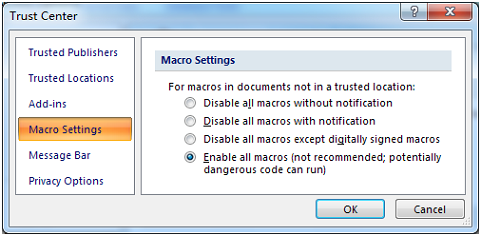
4. Press Alt+F11 in Access to open Microsoft® Visual Basic editor.
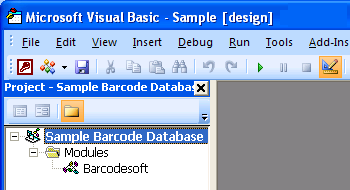
5. From Visual Basic editor, choose menu Tools ===> References. It will popup a dialog. Click Browse button and choose cruflbcs.dll from your working folder.
Usually it's under C:\Program File\CommonFiles\Barcodesoft\Fontutil folder.
Click the checkbox beside crUFLBcs 1.0 Type Library as shown below. Then click OK button.
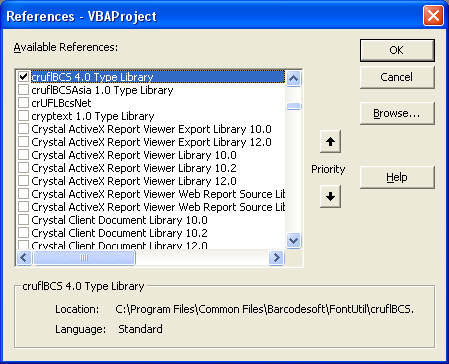
6. Press Ctrl+M, it will popup a dialog, choose barcodesoft.bas under
C:\Program File\CommonFiles\Barcodesoft\Fontutil folder. Then click "Open".
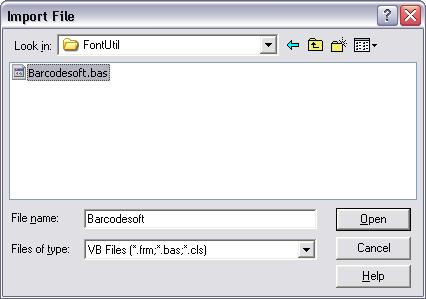
If Code128 or GS1128 function looks different from the codes below,
please copy and paste the following code snippet to replace it in barcodesoft module.
Public Function GS1128(ByVal strToEncode As String) As String
Dim obj As cruflBCS.CLinear
obj = New cruflBCS.CLinear
UCCEAN128 = obj.UCCEAN128(strToEncode)
obj = Nothing
End Function
Public Function Code128A(strToEncode As String) As String
Dim obj As cruflBCS.CLinear
Set obj = New cruflBCS.CLinear
Code128A = obj.Code128A(strToEncode)
Set obj = Nothing
End Function
Public Function Code128B(strToEncode As String) As String
Dim obj As cruflBCS.CLinear
Set obj = New cruflBCS.CLinear
Code128B = obj.Code128B(strToEncode)
Set obj = Nothing
End Function
Public Function Code128C(strToEncode As String) As String
Dim obj As cruflBCS.CLinear
Set obj = New cruflBCS.CLinear
Code128C = obj.Code128C(strToEncode)
Set obj = Nothing
End Function
7. Close Visual Basic and go back to your Access database. Now, create a report in Design view and type in one of the following macros in the field where you want to show code128 barcode before apply font typeface, such as code128amHr:
=Code128A([data.code])
=Code128B([data.code])
=Code128C([data.code])
=GS1128([data.code])
Please notice that 'data' is the Table name, 'code' is the Field name.
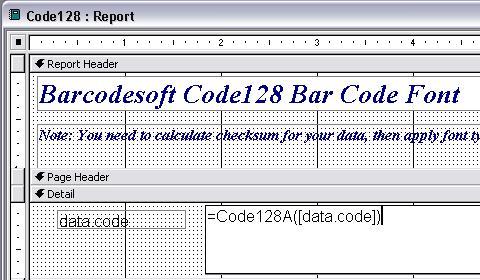
8. Right click the field you want to display code128 barcode. Choose Properties from context menu. Apply one of the appropriate font typefaces to the field, such as code128amHr.
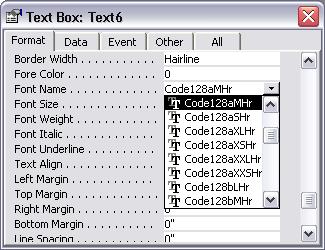
For more information about code128 barcode, please click Code128 barcode.
Microsoft and the Office logo are trademarks or registered trademarks of Microsoft Corporation in the United States and/or other countries.
|
|
|